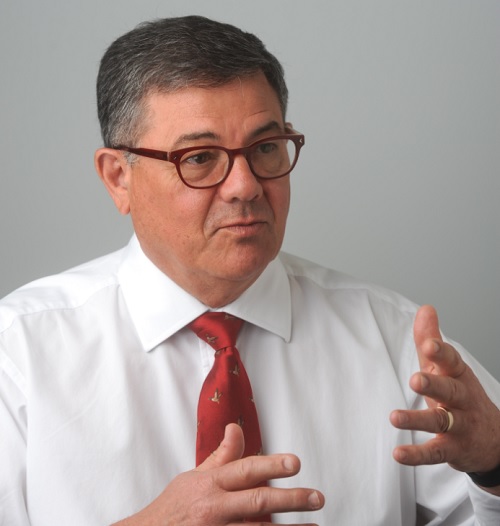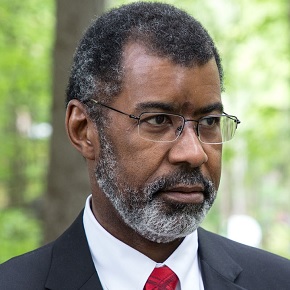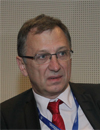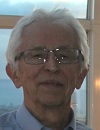 |
||
|
Peter Prozesky: WANO unites every company and country in the world with a commercial NPP AtomInfo.Ru, PUBLISHED 07.08.2018 Chief Executive Officer at the World Association of Nuclear Operators (WANO) Peter PROZESKY answered the questions of the Russian independent nuclear online newspaper AtomInfo.Ru. CONTINUED BELOW Peter Prozesky  Interviewer: What is the mission and principles of WANO? Peter Prozesky commented: "WANO's mission is to maximise the safety and reliability of nuclear power plants worldwide. We do this by working together to assess, benchmark and improve performance through mutual support, exchange of information, and emulation of best practices. We unite every company and country in the world with a commercial nuclear power plant to achieve the highest possible standards of safety and reliability. We achieve our mission by providing our members with a series of high quality services, or programmes. These include peer reviews, technical support missions, trainingcourses/seminars and networking events. We also analyse safety and performance data from plants worldwide, from which we derive valuable insights on key industry issues and trends. WANO has offices in London and Hong Kong, and regional centres in Moscow, Atlanta, Tokyo and Paris. We are a non-profit organisation and don't advocate for the nuclear industry. With safety as the only goal, we help operators communicate effectively and share information openly. Experience shows many accidents could have been prevented if lessons had been learned from previous incidents. I think it's also important to emphasise that WANO is not just interested in minimum standards. We see who is the best in the world, then want everyone to emulate best performance and aim to raise the performance of all operators to that of the best."
Interviewer: Who can become a member of WANO? We know that there are three categories of the WANO's membership, can you explain us the difference between it? Peter Prozesky commented: "Any operator or owner of a commercial nuclear power plant or nuclear fuel reprocessing facility (for civil purposes) - or any organisation of nuclear power plant operators that has an important impact on nuclear safety - can apply for membership in WANO. There are three categories of membership, and the category for each member is determined on participation, representation and influence over nuclear safety. Of course, our membership is mainly comprised of nuclear plant operators. However, in certain circumstances other organisations that impact nuclear safety may be able to receive certain WANO products or services. Upon reaching an agreement with WANO, such organisations must complete a confidentiality agreement. WANO membership is voluntary and once an application has been approved, all members must follow all our key membership obligations. More information on membership is on our website." Interviewer: The WANO missions are the frequent visitors on the nuclear plants around the world. What is the difference between the pre-start peer reviews, peer reviews, follow-up peer reviews, corporate peer reviews and the member support missions? Peter Prozesky commented: "I think that's an interesting question, as we offer several peer review related services. To start with, WANO provides all new units with a pre-start-up review before initial criticality. A team of specialists manage these reviews, which are increasing at a significant pace, particularly in Asia. Peer reviews are conducted every four years, and help members compare themselves against standards of excellence through an in-depth, objective review of their operations by an independent team from outside their organisation. Peer review teams are made up of full time WANO staff, as well as people from power stations around the world. It is important for this process to be transparent inside WANO, and confidential outside of WANO, so that plant workers will discuss their problems openly, to allow us to help the company improve its performance. Through peer reviews, members learn and share worldwide insights on safe and reliable plant operation and thereby improve their own performance. The result is a frank confidential report that highlights strengths and areas for improvement in nuclear safety and plant reliability. A peer review will identify some areas for improvement (AFIs), that the member will need to start implementing before the follow up peer review is conducted 2 years after the peer review. Follow-up peer reviews check on what progress has been made on the nuclear safety significant AFIs since the last peer review. Follow up peer reviews are typically of a shorter time duration with fewer team members than the official WANO peer review. The results of the follow-up are discussed with the applicable leadership and a summary of the follow-up peer review report is provided to the utility CEO. The same principles extend to companies, as well as stations, in the form of the corporate peer reviews. Safety culture is important from the boardroom to the individual plant operator. WANO carries out corporate peer reviews to examine how decisions made at a member's headquarters affect nuclear safety across the company. The peer review process does not end once the team leaves the site. Member support missions are carried out at the request of a plant or utility and provide a means for WANO members to assist each other in addressing identified issues or problems. A team of peers is selected on the basis of their expertise in the applicable area. The team reviews issues identified during peer reviews or other problems and helps to identify potential solutions." Interviewer: WANO offers different programmes for its members. What are the main activities of WANO in Russia and other countries of European and Asian region? Peter Prozesky commented: "In Russia and Euro-Asia, WANO Moscow Centre implements all the WANO programmes and services. We look at the performance of the entire operation of nuclear plants. For instance, this includes the nuclear facilities of Atomflot in Russia. We conduct regular peer reviews of operating power plants, pre-startup peer reviews of new units, and corporate peer reviews of the owner/operating company. Many activities provide assistance and support to WANO members, delivered through support missions and benchmarking on a wide range of issues from construction, to operation, upgrades and decommissioning. A key focus of activities is to support countries and companies that are new entrants to the nuclear industry and intend to build their own nuclear power plants. WANO Moscow Centre is actively cooperating with these newcomers in countries within Western Europe, as well as Bangladesh, Belarus and Turkey. Moscow Centre raises awareness among members of good safety practises and lessons learned. For example, our staff collect and disseminate information on plant events and publish best industrial practices. We also conduct activities on personnel training and development in the form of seminars, interactive workshops, expert meetings and training courses. A special initiatives of this region is the international emergency response centre, whose members today include 11 operators with VVER, RBMK, BN and EGP reactors. They take part in online information exchange and joint annual emergency exercises and drills." Interviewer: Do you cooperate with other international organisations such as the IAEA, the OECD-NEA and so on? Peter Prozesky commented: "I'm delighted to say we have an excellent, close relationship with both the IAEA and the OECD NEA - and many other international and national organisations involved in nuclear safety or reliability. We have worked closely with the IAEA for several years and signed a formal memorandum of understanding with them in 2012. However, our collaboration with the IAEA begun much earlier. For example, we share information on events reported by the nuclear operators. Furthermore, we also ensure there is close co-ordination between the two organisations for the safety evaluations carried out by IAEA (OSARTs) and by WANO (Peer Reviews). We organise a formal, general meeting between the two organisations twice a year, but individual staff in certain programmes will typically meet more frequently. We have also signed a memorandum of understanding with the OECD Nuclear Energy Agency (NEA). This cooperation between our two organisations is related to safe operation of nuclear power plants. For example, we cooperate on topics like nuclear safety culture. Here we are examining how we can work together to have a common understanding and international language on the definition of nuclear safety culture. Very recently, in January 2018, we attended a workshop organised by the Nuclear Energy Agency in Sweden to explore this theme. One of our most important shared interests with these two organisations is how we deliver support to new entrants to the nuclear industry, for example Bangladesh and Turkey. New entrants already have relations with the IAEA, and some also with the OECD-NEA. In future, we can organise workshops with the IAEA, OECD-NEA and new entrants, to support them on the journey to safe and reliable production of nuclear power." Interviewer: Last question. Could you please elaborate your Young Generation activities? Peter Prozesky commented: "WANO Young Generation (WANO YG) is a network for collaborating with existing young nuclear organisations. It will empower these groups - nationally, regionally and internationally - by working together with organisations such as the International Youth Nuclear Congress (IYNC), the World Nuclear University (WNU) and the European Nuclear Society Young Generation Network, to co-ordinate activities. With the WNU for example, we sponsor a scholarship to its Summer Programme. This means at least one promising young nuclear professional can attend the Institute each year, to broaden their capabilities and network - with a strong focus on developing their leadership skills. In addition to cooperating with the existing YG organisations, WANO YG intends to offer specific activities to young professionals working for WANO members, including, for example, participation in peer reviews (PRs) or member support missions (MSMs) taking place at their nuclear power facility. I believe WANO's Moscow Centre in particular has conducted some commendable work in the region with its members to involve and engage with the younger generation of nuclear professionals. Changes in the nuclear workforce and the decision of many countries to start a nuclear programme are a reality in all regions around the world. The need to attract young talent and retain knowledge in the nuclear industry is crucial and can pose challenges for WANO members. For this reason, WANO has started this new initiative to help its members to make this transition. The WANO YG mission is to create future leaders for safe and reliable operation of nuclear power plants, through networking, professional development, and knowledge transfer within the WANO membership. This area requires further focus and we will be developing new initiatives for WANO YG in the near future." Interviewer: Thank you very much for your interview for AtomInfo.Ru. Topics: Interview Other news: The pre-stressing system installation has been completed at Unit 1 at Belarus NPP Readiness of the pre-stressing system is one of the necessary conditions of the next critical operation. 443 nuclear units are operating in the world Another 65 units have the status of the being built one. New American submarine will be named after admiral Rickover 60th anniversary of the first trip of the nuclear submarine Nautilus. |
Hero of the day 
William D. Magwood, IV: it was a great trip for me It has been a great trip for me. I learned more about what the Russian organizations are doing. We saw some new opportunities for cooperation and also I heard about some activities I would like to learn more about. INTERVIEW
Vladimir Kriventsev OPINION
Siegfried Hecker Last news:
|
Licence Эл №ФС77-30792. ATOMINFO™ trademark.

